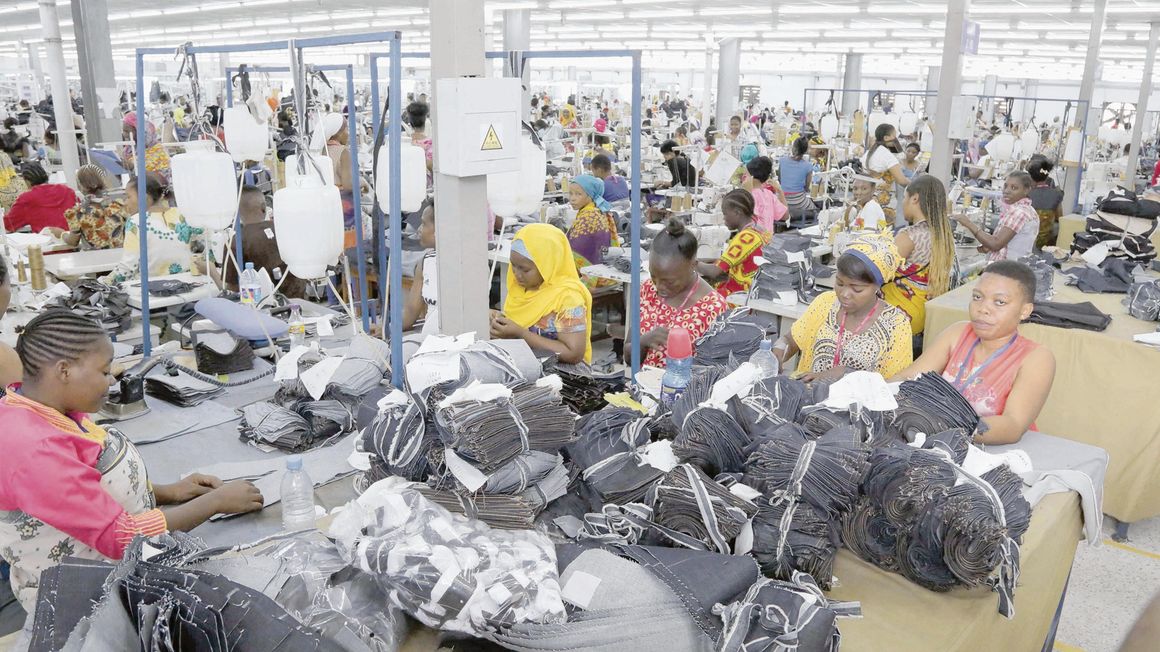
Photo taken on October 02, 2017 shows Tooku garments workers at Export Processing Zones Authority (EPZA) in Dar es Salaam.
Dar es Salaam. The government has outlined how it will involve the private sector in implementing the Sh114.8 trillion development plan in the next five years.
The Five Year Development Plan III (2021/22 to 2025/26) whose draft was tabled in the National Assembly on Monday will require financial resources to implement it and part of the money will come from the private sector.
The country will require a total of Sh114.8 trillion during the period where Sh74.2 trillion of it will be sourced from the public sector while the private sector will contribute the remaining Sh40.6 trillion.
The private sector involves smallholder farmers, pastoralists, Small, Medium and Micro Enterprises (MSMEs,) community entrepreneurs, service providers and associations of various groups of entrepreneurs.
According to the FYDP III draft, the government will facilitate access to finance for Small and Medium Enterprises (SMEs) through capacity building programmes; formalize the informal businesses, linking them with financial institutions and through Public-Private Partnerships (PPPs).
The FYDPIII will also increase the participation of the private sector in the establishment, amendment and implementation of policies regarding domestic and foreign investment and trade, according to the document.
“The government recognizes the important role played by the private sector during the implementation of the second development plan (FYDP II), particularly, the investments in development projects, industries and creation of jobs,” the draft reads in part.
Establishment of a ‘One Stop Center’ at Tanzania Investment (TIC), 11 institutions responsible for permits, licenses and other approval procedures of both local and foreign traders and investors to start the businesses.
Until February 2020, a total of 146 projects worth $1.54 billion were registered through TIC, providing 26,384 new jobs.
Micro, Small and Medium Enterprises (MSMEs)
The government defines MSMEs as businesses involving one to four people, mostly are family activities with a capital of up to Sh5 million shillings with annual sales of Sh12 million shillings.
The latest National Basic and Medium Entrepreneurship Survey conducted in 2012 estimates that four out of five people in the private sector are engaged in informal activities.
The biggest challenge for small businesses is sustainability, according to the FYDP III, saying it is difficult to track down the traders and serve them properly.
Latest data show that approximately 4.3 million households have employed in the informal sector, and they often lack access to supportive services and decent job opportunities.
“Most small businesses are unsustainable. Their average lifespan is 4.1 years old,” the FYDP III reads in part.
MSMEs are facing unfriendly environments and systems which make it difficult for them as part of the private sector to access finances, recognition, protection, tax payments, cross-border markets and contract management.
The private sector also suffers from poor trade and management skills, poor technology, and limited capital thus fail to be competitive in regional and international markets.
Despite the challenges, the private sector accounted for 68 percent of the national capital increment between 2016 and 2019, creating at least 716,624 jobs.
The private capital reached Sh41.8 trillion in 2019 from Sh24.9 trillion shillings as recorded in 2016.
The government believes that empowering the private sector through friendly policies will expand the sector, increasing its contribution to the economy, private investment, creating more jobs, technology transferring and skills development.
Speaking in the parliament recently, the Minister of Finance and Planning Dr Philip Mpango said the government expects the private sector to generate about eight million new jobs between mid-July 2021 and June 2026.
According to him, the private sector will be the key on implementing the five goals of the FYDP III 2021/22 - 2025/26 aiming at building the competitive economy and human development.
“The program’s priorities are; stimulating the competitive and participatory economy, strengthening the capacity for industrial production and service delivery, business promotion, stimulating human development and developing human resources,” he noted.





No comments :
Post a Comment